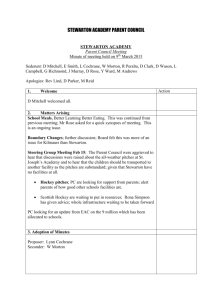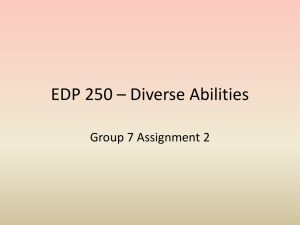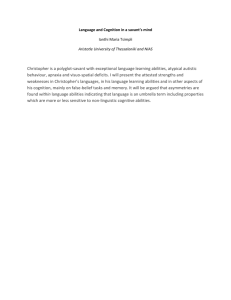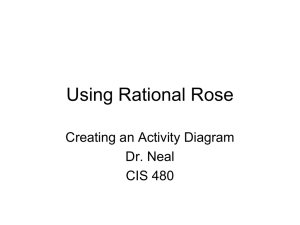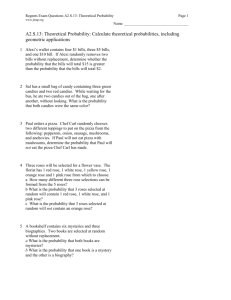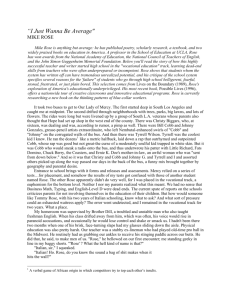Sheri Roberts
advertisement
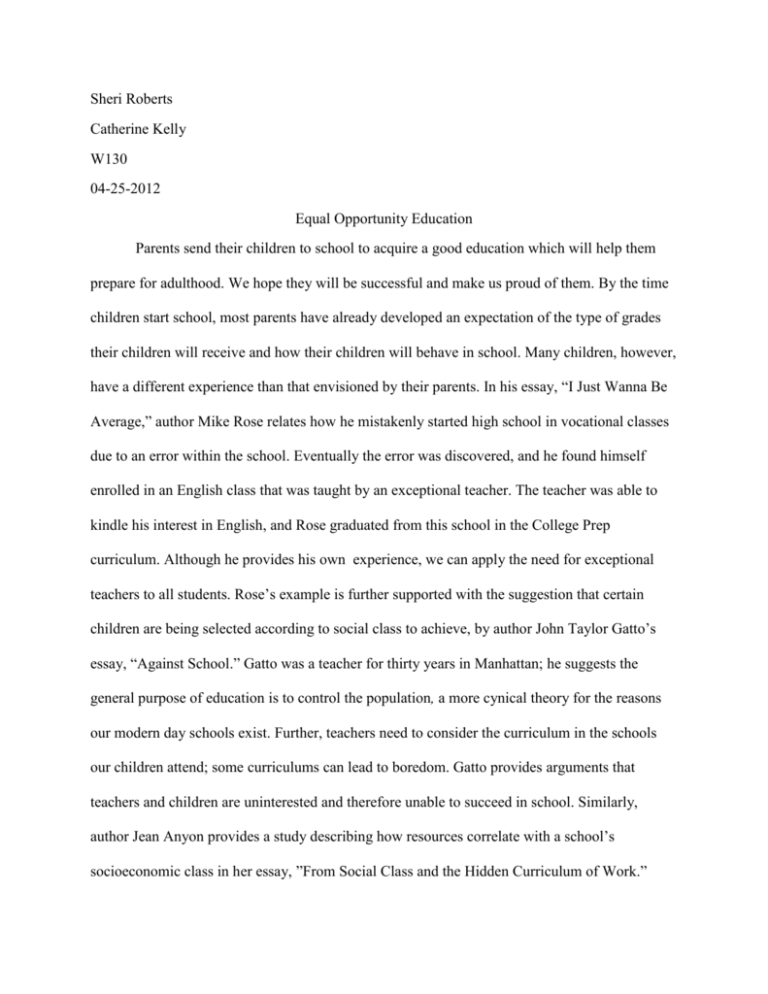
Sheri Roberts Catherine Kelly W130 04-25-2012 Equal Opportunity Education Parents send their children to school to acquire a good education which will help them prepare for adulthood. We hope they will be successful and make us proud of them. By the time children start school, most parents have already developed an expectation of the type of grades their children will receive and how their children will behave in school. Many children, however, have a different experience than that envisioned by their parents. In his essay, “I Just Wanna Be Average,” author Mike Rose relates how he mistakenly started high school in vocational classes due to an error within the school. Eventually the error was discovered, and he found himself enrolled in an English class that was taught by an exceptional teacher. The teacher was able to kindle his interest in English, and Rose graduated from this school in the College Prep curriculum. Although he provides his own experience, we can apply the need for exceptional teachers to all students. Rose’s example is further supported with the suggestion that certain children are being selected according to social class to achieve, by author John Taylor Gatto’s essay, “Against School.” Gatto was a teacher for thirty years in Manhattan; he suggests the general purpose of education is to control the population, a more cynical theory for the reasons our modern day schools exist. Further, teachers need to consider the curriculum in the schools our children attend; some curriculums can lead to boredom. Gatto provides arguments that teachers and children are uninterested and therefore unable to succeed in school. Similarly, author Jean Anyon provides a study describing how resources correlate with a school’s socioeconomic class in her essay, ”From Social Class and the Hidden Curriculum of Work.” Schools don’t actually perform the function mainstream America expects them to. Every child learns differently: some may require individual attention, some may need to have focus placed on strengths, and others may require reduced or escalated pace to achieve best performances. Teachers need the freedom to modify their curriculum and teaching habits, to develop techniques to adjust for the differing needs of their students. The change needs to start with the school systems that are in charge of educating our nation’s children. In America, we believe all citizens should be treated with equality; this right needs to extend also to children. Many of our schools however, adjust their curriculums to teach skills according to social class. Gatto lists the six basic functions of American schooling according to Author Alexander Inglis’s 1918 book Principles of Secondary Education. The fourth function is described as: “The differentiating function. Once their social role has been ‘diagnosed,’ children are to be sorted by role and trained only so far as their destination in the social machine merits – and not one step further. So much for making kids their personal best” (153). This view is reprehensible; it reeks of discrimination. First, we must have a school system that recognizes the importance of their mission and teachers whose goals are to educate all children regardless of class. According to Anyon, there is a hidden agenda in our schools. She advises, “Scholars in political economy and the sociology of knowledge have recently argued that public schools in complex industrial societies like our own make available different types of educational experience and curriculum knowledge to students in different social classes” (170). In short, if a children live in a working class neighborhood, they will attend a school that teaches docility and obedience, qualities necessary for unskilled labor. If children live in an elite affluent area, they will attend schools where they will learn critical thinking and decision making skills, which are necessary for professional positions. Anyon describes how children from lower socioeconomic classes do not receive instruction that provides multidimensional and varied teaching methods to reach their individual needs. This pattern of selective schooling greatly undermines the opportunities for success of all students. An attitude of expectation for children to succeed, to provide avenues for children to work to the best of their abilities and taking the steps necessary to include all children, needs to be the focus of our educators. Children who are born into working class families need not be limited because of the income level of their parents. When we don’t provide the resources necessary for children to progress to their individual aptitude, we shortchange our society. Children should have access to an education that helps them succeed, regardless of the socioeconomic position of their parents and regardless of their ability to conform to one-dimensional teaching techniques. Children who grow up with belief in themselves and in their abilities have a greater potential to contribute to our society; the neighborhood in which they live should not prevent them from discovering this potential. Imposing rigid styles of teaching cultivates boredom for both the teacher and the student which then makes inspiration virtually nonexistent. Gatto describes the pervasive feeling of boredom in schools: “Of course, teachers are themselves products of the same twelve-year compulsory school programs that so thoroughly bore their students, and as school personnel they are trapped inside structures even more rigid than those imposed upon the children”(148). We are all unique in our abilities; the intention of school needs to be to help recognize and expound upon children’s abilities. The need for education to fit the student is evident as Rose relates his experience in the vocational track. He illustrates how unmotivated he was by the lack of direction he received when he was labeled a vocational student. Rose argues,” It wasn’t just that I didn’t know things- didn’t know how to simplify algebraic fractions, couldn’t identify different kinds of clauses, bungled Spanish translations- but that I had developed various faulty and inadequate ways of doing algebra and making sense of Spanish”(160). Withholding instruction in areas that can enhance their abilities can set children up for failure. Our society has become advanced in procedures and techniques. If we do not share this information and encourage children to reach their potential, we inhibit their growth. This inhibition, in turn, limits the possible contributions they can make to generations to come. The practice of educating only particular children to higher ideals, and choosing to limit children who are perceived as unworthy because of socioeconomic position and learning process, is to the detriment of the individual as well as to society. Because we place high importance on education in America, the ability to secure an education needs to be available to every child. With the credentials of a good education, job opportunities and earning potential increase along with respect for academic intelligence level. The children who are easy to teach, who can follow along and quickly understand what is being taught well enough to score high on tests, stand a greater chance of excelling in school. What about the children who need more? Does that mean they have a lower intelligence level and therefore deserve less respect and options? In America, wealth should not correlate to opportunity, but many times it does, unless a student is lucky enough to encounter an excellent teacher as Rose did. His English instructor, Jack MacFarland, had not earned additional credentials; howeve,r he had earned his degree from a prestigious university and his teaching style reflected his own education. He was teaching at the Catholic high school Rose attended,and he was dynamic and able to capture his students’ interest. Rose relates, “MacFarland’s lectures were crafted, and as he delivered them he would pace the room jiggling a piece of chalk in his cupped hand, using it to scribble on the board the names of all the writers and philsophers and plays and novels he was weaving into his discussion…He slowly and carefully built up our knowledge of Western intellectual history – with facts, with connections, with speculations”(165). This teacher involved his students in their learning which allowed them to see how it can be useful in everyday life. He had the ability to inspire the students who needed additional stimulus to achieve beyond their previously demonstrated abilities. Because of Rose’s encounter with this teacher, he became interested in school and eventually became an education professor and an award winning writer. Similarly, Gatto argues, “We could encourage the best qualities of youthfulness – curiosity, adventure, resilience, the capacity for surprising insight – simply by being more flexible abut time, texts, and tests, by introducing kids to truly competent adults, and by giving each student what autonomy he or she needs in order to take a risk every now and then”(149). We need a school system that empowers teachers to be creative and allows them to adapt to their students. Instead, we have a system that expects teachers to control and educate overcrowded classes with rigid structure in what and how they teach. To develop a school system in which children can flourish, it is necessary to reduce the number of children per class and allow teachers the time and tools they need to develop each student to the best of their ability. American history is filled with many great and important people who have made invaluable contributions to our country who did not come from wealthy families and who did not have a traditional education. The climate of our school system needs to be one of tolerance, the attitude of our teachers, one of patience and persistence in teaching our children. Many times teachers may start out with great ideas and ambition only to encounter resistance in the schools. Our teachers need to be empowered to cultivate an atmosphere that allows individuality, not overpowering conformity. My own children, twin sons, were labeled as learning disabled in elementary school. They persevered through a Catholic education and after graduation both of them served in the United States Military. They are now B students in college. Though they struggled academically in school, through their experiences, they have developed confidence in themselves and have realized they are capable of attaining anything that they set their minds to. They have had to overcome the misconceptions that were forced upon them in their early years. Many children are not as fortunate, so they have become trapped in the roles that are set for them by an archaic system. We can cultivate an environment in our schools where we celebrate differences and become invested in an education that is essential to the individual growth of all children. To limit our children’s potential is to limit the possibilities of the future of our country. Works Cited Colombo, Gary, Robert Cullen, and Bonnie Lisle, eds. Rereading America: Cultural Contexts for Critical Thinking and Writing. Boston, New York: Bedford/St Martins, 2010. Print. Gatto, John Taylor. “Against School.” Colombo, Cullen, and Lisle 148-155. Rose, Mike. “I Just Wanna Be Average.” Colombo, Cullen, and Lisle 157-168. Anyon, Jean. “From Social Class and the Hidden Curriculum of Work.” Colombo, Cullen, and Lisle 169-185.

